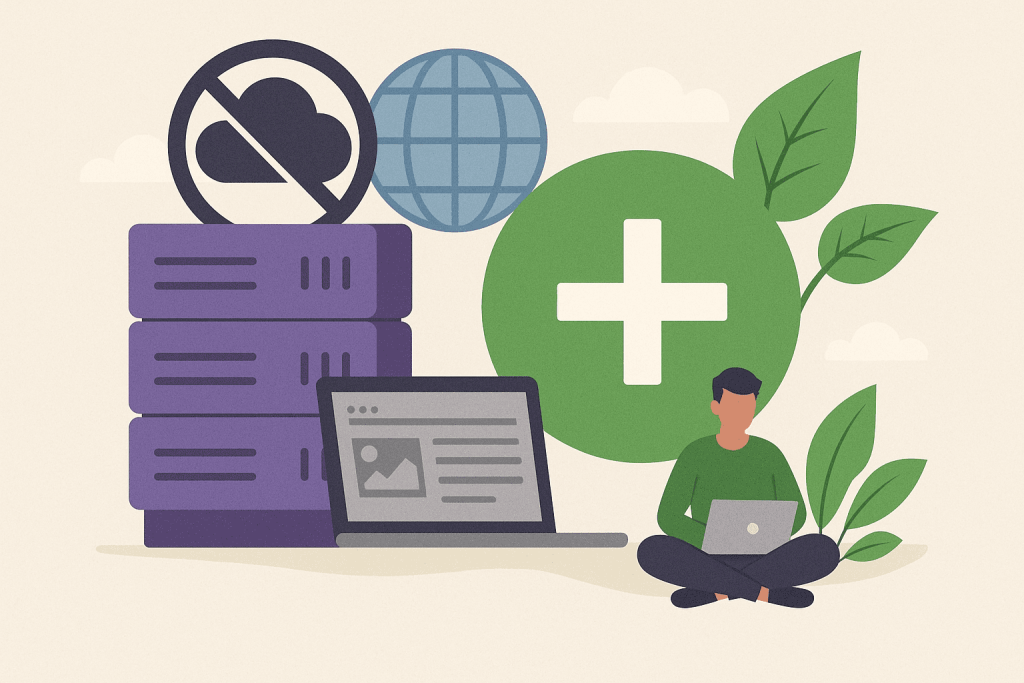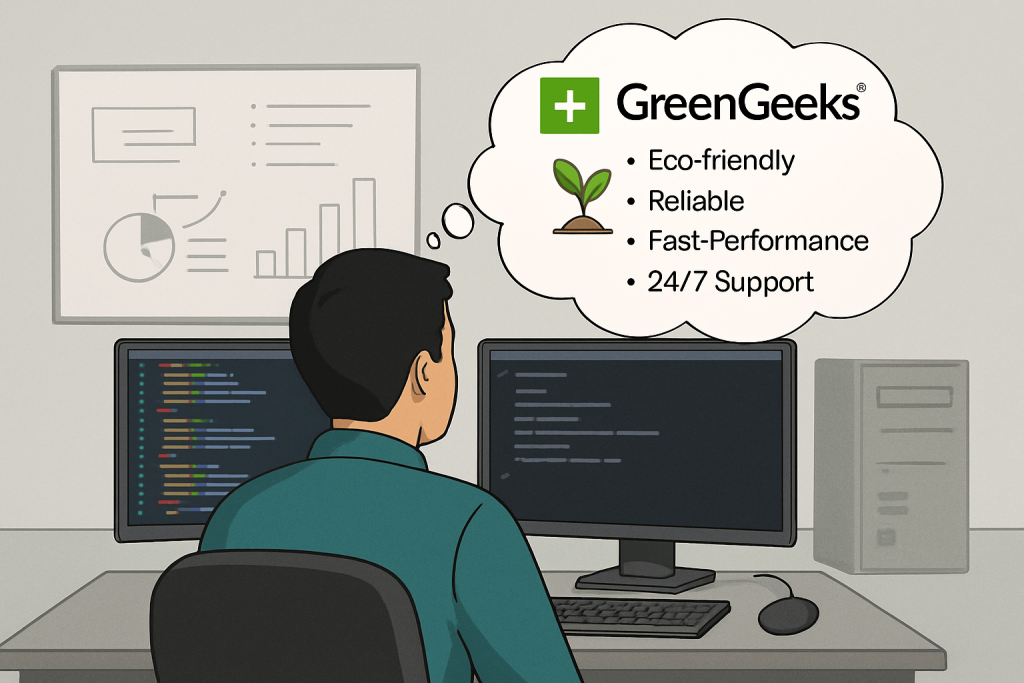When looking for web hosting services, many website owners compare different providers to find the best fit for their specific needs. GreenGeeks has positioned itself as a strong alternative to Hostinger, particularly for users who value environmental responsibility alongside reliable hosting features. The comparison between these two providers reveals distinct differences in their approaches to service delivery, resource allocation, and customer support.
Environmental Commitment and Energy Usage
GreenGeeks operates with a 300% renewable energy match policy. For every unit of energy the company consumes in its operations, it purchases three units of renewable energy credits and returns them to the grid. This approach goes beyond carbon neutrality. The company holds certification as an EPA Green Power Partner, which provides third-party verification of its environmental claims.
Hostinger has not published comparable environmental certifications or renewable energy commitments as of August 2025. For businesses and website owners who factor environmental responsibility into their purchasing decisions, this difference represents a concrete distinction between the two providers. GreenGeeks’ renewable energy program translates to measurable environmental benefits that customers can quantify and report in their own sustainability initiatives.
Server Infrastructure and Geographic Coverage
The physical location of servers affects website performance for different audiences. GreenGeeks maintains data centers in the United States, Canada, Singapore, and the Netherlands. This configuration provides strong coverage for North American markets, with additional presence in Europe and Southeast Asia. Businesses targeting primarily Western audiences benefit from this server distribution, as proximity to servers typically results in faster loading times for visitors.
Hostinger operates a broader international network with servers in the United Kingdom, United States, Brazil, Indonesia, Singapore, Netherlands, and Lithuania. This wider geographic spread serves websites with truly global audiences better, particularly those with substantial traffic from South America or Eastern Europe. The additional server locations give Hostinger an edge for sites that need consistent performance across multiple continents.
Performance Metrics and Speed Testing
Both providers guarantee 99.9% uptime through their service level agreements. Independent testing from platforms like GTmetrix and WebPageTest shows that both companies generally deliver on this promise. GreenGeeks’ average loading times measure around 1.2 seconds in standardized tests, which places it among the faster shared hosting providers. Hostinger frequently posts slightly faster times in international testing scenarios, largely due to its more extensive server network.
The performance difference becomes more noticeable for sites serving audiences far from server locations. A website hosted on GreenGeeks’ North American servers will load quickly for visitors in the United States and Canada, but may show slower response times for visitors in South America or Eastern Europe compared to the same site hosted on Hostinger’s more geographically distributed network.
Both companies use LiteSpeed servers and include Cloudflare CDN integration as standard features. These technologies help minimize the performance gap between server locations by caching static content closer to end users. The actual performance difference for most websites falls within fractions of a second, though these small differences can matter for e-commerce sites or applications where every millisecond counts.
Pricing Structure and Resource Allocation
Hostinger markets itself aggressively on price, frequently offering entry-level plans below $3 per month during promotional periods. These low prices attract budget-conscious customers but come with restrictions on resources. Entry-level Hostinger plans limit the number of websites, storage space, and sometimes exclude features like daily backups.
GreenGeeks’ pricing starts higher than Hostinger’s promotional rates. However, GreenGeeks includes unlimited SSD storage, unlimited bandwidth, unlimited email accounts, and daily automated backups across all plans. These features often cost extra on other platforms or require upgrading to higher-tier plans. The pricing comparison becomes more complex when factoring in renewal rates, as Hostinger’s promotional prices increase substantially after the initial term.
Looking at total cost of ownership over multiple years, the price difference narrows considerably. A website that grows beyond the resource limits of Hostinger’s entry plans would need to upgrade, while the same site on GreenGeeks could continue operating on the base plan due to the unlimited resource allocation. This makes GreenGeeks particularly suitable for websites planning for growth or uncertain about their future resource needs.
Feature Comparison and Technical Capabilities
GreenGeeks provides unlimited domains, subdomains, and databases on all plans. The company includes free SSL certificates, including Let’s Encrypt wildcard SSL options, across all service tiers. Daily backups run automatically without additional charges, and customers can restore their sites from these backups through the control panel.
Hostinger limits websites and storage on entry and mid-tier plans, with caps varying by plan level. The company allows up to 100 websites on some plans, which exceeds what most users need but still represents a hard limit. Daily backups typically require a premium subscription or add-on purchase on Hostinger’s lower-tier plans.
Security features differ between the providers in implementation rather than presence. Hostinger integrates tools like BitNinja and Immunity360 on higher-tier plans, providing AI-driven firewall protection and anti-DDoS traffic analysis. GreenGeeks counters with 24/7 proactive monitoring, account isolation technology, spam and virus filtering, automatic CMS updates, and its own AI-powered web application firewall. Both approaches provide solid security, though the specific tools and methods vary.
Developer Tools and Technical Flexibility
Website developers and technical users need access to specific tools and technologies. GreenGeeks supports PHP 8.4 and newer versions, Node.js, Git with native integration, SSH, SFTP, PostgreSQL, MySQL, Python, and WP-CLI. These tools come standard regardless of the chosen plan, giving developers full access to the technologies they need for modern web development.
Hostinger provides similar developer tools but gates some features by plan level. The company offers ASP.NET and Java support, which GreenGeeks does not provide. This makes Hostinger a better choice for developers working with Microsoft technologies or Java-based applications. Git, SSH, and Node.js support exists on Hostinger but may require upgrading from entry-level plans.
Database access represents another technical difference. GreenGeeks allows unlimited databases on all plans, while Hostinger sets limits based on the service tier. For developers managing multiple projects or complex applications with numerous database requirements, this unlimited access removes a potential bottleneck.
Customer Support and Migration Services
Support quality affects the overall hosting experience, particularly during setup or when problems arise. GreenGeeks provides 24/7 support through live chat, tickets, and email. The company also offers phone support during North American business hours. Response times for chat and ticket support typically measure in minutes rather than hours, based on aggregated customer feedback from 2025.
Hostinger offers 24/7 chat and ticket support but does not provide phone support. Reports from 2025 indicate that Hostinger’s chat wait times sometimes exceed 20 minutes during peak periods. While both companies staff their support teams around the clock, GreenGeeks generally receives higher marks for response speed and technical knowledge from customer reviews.
Migration support matters for customers switching from other hosts. GreenGeeks includes free managed migrations for WordPress, WooCommerce, Joomla, and custom sites. The company’s support team handles the technical aspects of moving websites, databases, and email accounts. Hostinger also offers free migrations on most plans, though the process may require more customer involvement depending on the site complexity.
Control Panel and User Interface
The control panel affects daily management tasks and ease of use. GreenGeeks uses cPanel, the industry-standard control panel familiar to many webmasters. This interface provides comprehensive access to all hosting features, from email management to database administration. Users switching from other cPanel hosts find the transition straightforward.
Hostinger developed its proprietary hPanel interface, which many new users find more intuitive than traditional cPanel. The streamlined interface focuses on common tasks and presents information in a more modern layout. However, hPanel lacks some advanced features available in cPanel, particularly on lower-tier plans. Experienced webmasters often prefer cPanel’s comprehensive feature set, while beginners may appreciate hPanel’s simplified approach.
Email Hosting and Communication Tools
Email services come bundled with both hosting providers, but with different limitations. GreenGeeks includes unlimited email accounts on all plans, with no restrictions on storage or number of addresses. Users can create as many email accounts as needed for their domains, set up forwarders, and configure autoresponders without worrying about hitting limits.
Hostinger includes email services, but sets limits based on the plan level. Entry-level plans may restrict the number of email accounts or total email storage. For businesses that rely heavily on email communication or need numerous departmental addresses, these limitations could necessitate plan upgrades.
Both providers support standard email protocols, including IMAP, POP3, and SMTP. Webmail interfaces allow checking email through browsers, and both services work with standard email clients like Outlook, Thunderbird, and mobile mail applications.
Backup Systems and Data Protection
Data protection strategies vary between the two providers. GreenGeeks runs daily automated backups on all accounts as a standard feature. These backups retain multiple restore points, allowing customers to roll back their sites to previous states if needed. The backup system operates independently of customer actions, providing protection even if users forget to create their own backups.
Hostinger’s approach to backups depends on the selected plan. Lower-tier plans may not include automated daily backups, requiring customers to purchase this feature separately or manage their own backup routines. Higher-tier plans include backup services, but the frequency and retention periods vary by plan level.
The difference in backup approaches affects both security and convenience. Websites on GreenGeeks benefit from automatic protection against data loss from the start. Hostinger customers on basic plans need to implement their own backup strategies or upgrade their services to include automated backups.
Specialized Hosting Options
Beyond shared hosting, both companies offer additional service types. GreenGeeks provides shared, VPS, reseller, and dedicated hosting options. The reseller hosting program allows customers to start their own hosting businesses, with white-label options and billing software included. VPS and dedicated servers serve customers needing more resources or greater control over their hosting environment.
Hostinger focuses on shared, VPS, and cloud hosting services. The company’s cloud hosting plans provide scalable resources for growing websites. While Hostinger doesn’t offer traditional reseller hosting programs, its VPS and cloud services can accommodate similar use cases with proper configuration.
Resource Monitoring and Account Management
Understanding resource usage helps prevent performance problems and plan appropriately for growth. GreenGeeks provides detailed resource monitoring through cPanel, showing CPU usage, memory consumption, disk space, and bandwidth utilization. The unlimited resource model means customers won’t face sudden shutdowns for exceeding limits, though fair use policies still apply to prevent abuse.
Hostinger’s hPanel includes resource monitoring tools that clearly show usage against plan limits. This transparency helps customers understand when they’re approaching limits and need to consider upgrades. The defined limits on Hostinger plans make capacity planning more straightforward, but also create hard ceilings that can affect site availability if exceeded.
Content Delivery and Caching Technologies
Website speed depends heavily on caching and content delivery optimization. GreenGeeks implements PowerCacher technology, which combines multiple caching layers to accelerate content delivery. The system includes browser caching, server-side caching, and CDN integration through Cloudflare. These technologies work together to reduce server load and improve response times.
Hostinger uses LiteSpeed Cache on its servers, providing similar multi-layer caching capabilities. The LiteSpeed system integrates well with popular CMS platforms like WordPress, offering specialized optimization for these applications. Both caching systems provide substantial performance improvements over non-cached hosting, with the practical differences being minimal for most websites.
Market Position and User Ratings
Customer feedback from 2025 shows GreenGeeks averaging ratings between 4.3 and 4.6 out of 5 across major review platforms. Customers frequently cite support responsiveness, uptime reliability, and sustainability commitments as primary reasons for their positive ratings. The consistency of these ratings across different review sites suggests genuine customer satisfaction.
Hostinger receives ratings between 4.2 and 4.4 out of 5, with affordability and speed receiving the most praise. The slightly lower ratings often stem from complaints about renewal pricing, upselling practices, and resource limitations on entry plans. Some customers report frustration with support wait times during busy periods.
Long-term Value Considerations
Evaluating hosting providers requires looking beyond initial prices to consider long-term value. GreenGeeks’ higher starting price includes features that cost extra elsewhere, potentially saving money over time. The unlimited resources model accommodates growth without forcing plan upgrades, providing predictable costs for expanding websites.
Hostinger’s aggressive introductory pricing appeals to new website owners and those testing ideas. However, renewal rates increase substantially, and growing sites may need plan upgrades to access necessary resources. The total cost over several years often equals or exceeds GreenGeeks’ pricing when factoring in these considerations.
Technical Support for Content Management Systems
Both providers support popular content management systems, but implementation details differ. GreenGeeks offers one-click installations for WordPress, Joomla, Drupal, and dozens of other applications through Softaculous. The company provides specialized WordPress hosting features, including automatic updates, staging environments, and WP-CLI access on all plans.
Hostinger also supports major CMS platforms with automated installation tools. The company’s WordPress hosting includes LiteSpeed Cache optimization and automatic updates. However, advanced WordPress features like staging environments may require higher-tier plans.
Conclusion
GreenGeeks presents clear advantages for specific use cases and customer priorities. The company’s 300% renewable energy match appeals to environmentally conscious businesses and organizations with sustainability requirements. Unlimited resources across all plans remove common growth constraints, while comprehensive backup and security features come standard rather than as add-ons.
The superior North American server density benefits websites primarily serving U.S. and Canadian audiences. Responsive customer support with phone options provides additional peace of mind for businesses requiring quick problem resolution. The inclusion of developer tools and unlimited databases on all plans serves technical users well.
Hostinger remains competitive for customers prioritizing initial cost savings and requiring global server presence. The broader server network serves internationally distributed audiences effectively. The proprietary hPanel interface may appeal to beginners, though it lacks some advanced features found in GreenGeeks’ cPanel implementation.
For businesses planning long-term growth, prioritizing environmental responsibility, or requiring comprehensive features without plan limitations, current data from 2025 indicates GreenGeeks provides better overall value. The combination of unlimited resources, standard backup protection, responsive support, and measurable environmental benefits creates a hosting package that serves most website owners’ needs effectively while contributing positively to renewable energy adoption.



